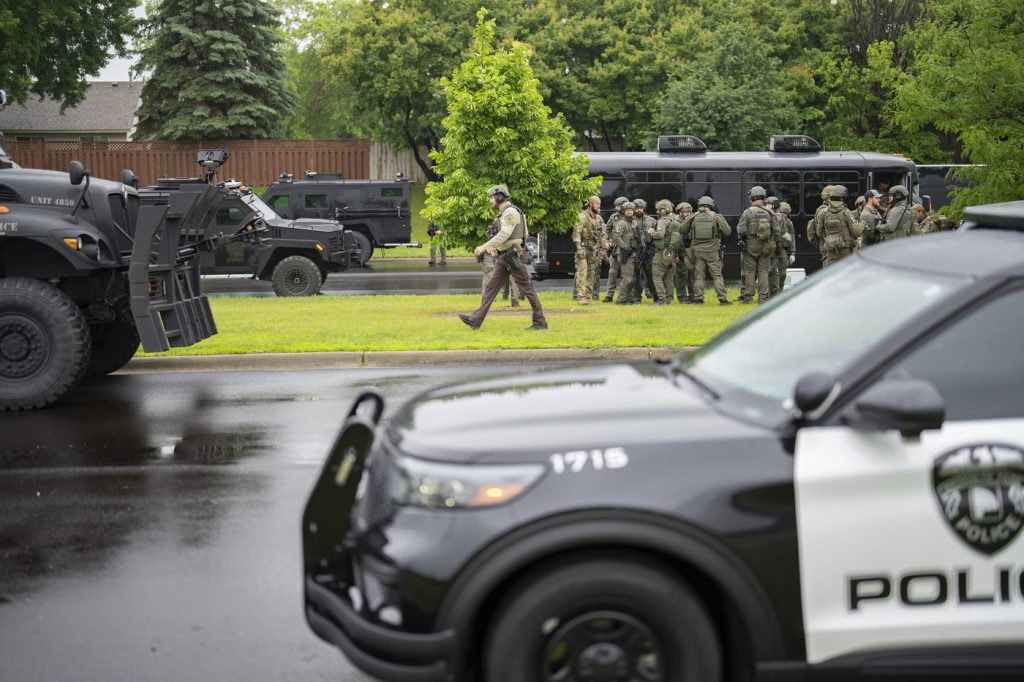DEIR AL-BALAH, Gaza Strip (AP) Overnight and into Saturday, Israeli strikes in the Gaza Strip resulted in the deaths of at least 20 Palestinians, according to local health officials. The ongoing 20-month conflict with Hamas persists, coinciding with Israel's new military actions against Iran, which have led to retaliatory drone and missile strikes.
In another incident, 11 Palestinians lost their lives near food distribution points operated by an Israeli- and U.S.-backed humanitarian group. This shooting marks the latest episode in a series of almost daily incidents at these sites since their reopening last month. Palestinian witnesses claim that Israeli forces fired upon the crowds, while the military contends they only issued warning shots towards individuals they deemed as suspects approaching their personnel.
The food distribution sites are located within military zones that are inaccessible to independent media. Israel's military confirmed that warning shots were fired to disperse a crowd near troops in the Netzarim corridor, after which an aircraft targeted an individual who continued to advance. The Gaza Humanitarian Foundation, responsible for managing the sites, announced closures for Saturday, but many desperate residents gathered nonetheless, needing food amid extreme conditions exacerbated by Israel's blockade and military operations, driving the region toward famine.
Reports from Al-Awda Hospital indicated that they received eight bodies and at least 125 injured individuals following a shooting near a food distribution site in central Gaza. Mohamed Abu Hussein, a local resident from the crowded Bureij refugee camp, recounted how Israeli forces opened fire from approximately one kilometer away from the distribution point, leading to panic as many ran to safety.
In Khan Younis, a southern city, Nasser Hospital recorded 16 deaths, including five women, following multiple Israeli strikes late Friday into Saturday. Additionally, three men were killed near GHF aid sites in Rafah, a city that has been largely depopulated due to ongoing conflict. The Israeli military claimed unawareness of any gunfire occurring at the time of those strikes.
A separate Israeli strike in Deir al-Balah claimed the lives of four individuals as reported by Al-Aqsa Hospital. Concurrently, Israel’s military noted that two projectiles had been fired from Gaza but landed in open areas without causing any injuries.
In terms of humanitarian efforts, Israel and the United States have initiated a new aid distribution framework aimed at displacing the United Nations’ operations in Gaza. Israeli authorities have accused Hamas of misappropriating the aid meant for civilians, using it to finance military activities. However, U.N. officials dispute these claims, asserting that Hamas has not diverted substantial amounts of aid. They argue that the new distribution system is incompatible with the growing needs of the Gazan population, as it allows Israel to control access to aid and forces people to travel long distances or face further displacement.
The humanitarian crisis has escalated despite Israel's decision to relax its blockade last month, as military restrictions continue to hinder aid delivery amidst increasing lawlessness. Since the conflict’s onset, Hamas, aligned with Iran, triggered the warfare on October 7, 2023, resulting in the deaths of approximately 1,200 people, mainly civilians, alongside the abduction of 251 individuals. Presently, they retain 53 hostages, of whom less than half are believed to be alive after negotiations resulted in the release of others during ceasefire agreements.
In retaliation, Israel's military campaign has reportedly resulted in over 55,000 Palestinian fatalities as stated by Gaza's Health Ministry, which notes that women and children constitute more than half of the deceased, though they do not differentiate between civilians and combatants in their figures. The extensive military operations have ravaged large sections of Gaza, displacing around 90% of its two million residents, leaving them severely dependent on international assistance. The war has also involved regional implications, drawing in Iran and its allies, subsequently motivating Israel's significant strikes on Iranian military and nuclear facilities.












